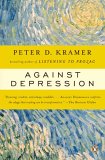Summary | Excerpt | Reviews | Beyond the Book | Readalikes | Genres & Themes | Author Bio

Critics' Opinion:
Readers' Opinion:
First Published:
May 2005, 368 pages
Paperback:
Jul 2006, 368 pages
 Book Reviewed by:
Book Reviewed by:
BookBrowse Review Team
Buy This Book
As I focused on the discrepancies in value that attach to
depression,
I began to enjoy my situation more. Around me swirled an eddy of
arguments
and assumptions about depression. I was in an odd current,
full of flotsam and jetsam. I began to save scraps that seemed
evocative.
I found myself trying to fashion a mental sculpture, a
multidimensional
collage, from shards that had floated into reach.
Perhaps one stray piece can serve as an example of the fragments I
collected. I had finished my talk and was back in the audience at a regional
conference on mood disorder. A psychoanalyst was next to present. He described
his treatment of a middle-aged patient who had come for help with depression
that had arisen out of the blue. The main features were leaden paralysis,
obsessive self-doubt, and low self-regard. The analyst had the impression that
for the whole of his life, the patient had been self-centered, blandly
confident, and lacking in insight. So the doctor allowed the episode to
continue. He hoped that the loss of confidence in particular would motivate the patient to engage in a
psychotherapy
that would make inroads against the narcissism.
I might once have considered this presentation unremarkable—an
example of a psychoanalyst "optimizing" a patient's level of
discomfort
in the service of a process of self-exploration. But now—with my
own patients' mood disorders so clearly in mind—I was seething.
Is
there another disease with which a doctor would make this
choice? If
a patient had cancer or diabetes and seemed psychologically the
better
for it—humbled, taken down a notch—still, we would treat the
condition
vigorously. Nor would a comparable argument, to let the syndrome
be, arise in a discussion of other mental illnesses, such as
anorexia or paranoia.
I found myself thinking about the particulars of depression in
this
patient, the one who turned to the psychoanalyst for help. What
do we
make of its unexplained appearance at midlife in a previously
confident
man? Perhaps the mood disorder resulted from a specific medical
condition,
outside the brain. Anemia can cause depression. If it did here,
would the analyst tolerate a blood disorder, to provide the
benefit of
low self-worth? If the patient recovered spontaneously, might
the doctor
recommend therapeutic bloodletting? The thought was an angry
one, I knew, but I was familiar enough with the brutality of
depression
to feel riled by the pride the speaker took in his choice, to
let the patient
flounder.
Causation aside—anemia or no anemia—the decision to leave
depression
untreated raises any number of ethical and practical concerns:
Who
will take responsibility for the harm depression does to the
patient's marriage
or career? Who will guarantee against suicide—since self-injury
is
always a risk when mood disorder drags on? And isn't it simply
bad
faith, when a person asks for help with an illness, to remain
silent about
potential treatments? The moral jeopardy (for the doctor) is
only magnified when the hoped-for collateral benefit—alleviating a personality
defect—concerns a problem that the patient might not
acknowledge.
I took my disgust as a sign that I fully accepted depression as
disease.
How not, given the recent accumulation of evidence? Scientists
were
demonstrating that depression is associated with specific
abnormalities
in brain anatomy. Depression was being implicated as a risk
factor for
stroke and heart disease. And depression is its own risk factor;
the
longer you are depressed now, the more liable you are to chronic
and
recurring mood disorder, with its harm to brain and blood
vessels and
the rest. Surely depression had earned its status as disease in
this particular
sense: doctors ought not be content to let it persist.
Excerpted from Against Depressionby Peter Kramer. Copyright 2005 by Peter Kramer. Reproduced by permission of Penguin Publishing. All rights reserved. No part of this excerpt may be reproduced or reprinted without permission in writing from the publisher.





The House on Biscayne Bay
by Chanel Cleeton
As death stalks a gothic mansion in Miami, the lives of two women intertwine as the past and present collide.

The Flower Sisters
by Michelle Collins Anderson
From the new Fannie Flagg of the Ozarks, a richly-woven story of family, forgiveness, and reinvention.

The Funeral Cryer by Wenyan Lu
Debut novelist Wenyan Lu brings us this witty yet profound story about one woman's midlife reawakening in contemporary rural China.
Your guide toexceptional books
BookBrowse seeks out and recommends the best in contemporary fiction and nonfiction—books that not only engage and entertain but also deepen our understanding of ourselves and the world around us.